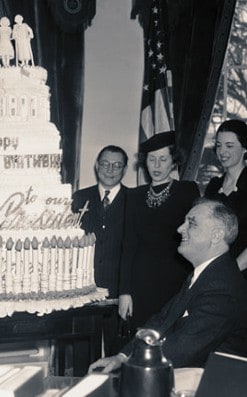Today, January 30, is Franklin D. Roosevelt’s birthday. In a week of mourning for Pete Seeger, that’s a good time to remember what Pete’s friend Woody Guthrie had to say in song about FDR: “This world was lucky to see him born.”
The White House website’s biography of Roosevelt says that, in a time of national crisis, “he restored our faith in ourselves.” That’s true, but it’s not the whole story. He restored our faith in government, and in government’s ability to serve as the expression of our best selves.
Roosevelt was an unapologetic liberal. He was an unapologetic believer in the goodness of humanity, and in the ability of government to channel that goodness for the betterment of all. And he was an unapologetic opponent of plutocrats, oligarchs, and greedy bankers.
Why do so many liberal politicians seem to apologize for their beliefs nowadays? There’s no need to apologize for FDR’s accomplishments, which should still be considered the cornerstone of his party’s achievements. There is no need to apologize for Social Security, a fully funded program that provides financial security for the elderly and disabled. There’s no need to apologize for the Federal Deposit Insurance Corporation, which protects our bank deposits and has probably prevented a full-scale depression more than once.
There is no need to apologize for the Tennessee Valley Authority, which opened the American South to growth and prosperity. Or for the Fair Labor Standards Act, the 40-hour work week, and the minimum wage.
On the occasion of Franklin Delano Roosevelt’s birthday, let’s agree to stop apologizing for government. Instead, let’s rededicate ourselves to working for what he called the Four Freedoms: freedom of speech, freedom of worship, freedom from want, and freedom from fear.
Roosevelt was born to a wealthy family. That may well explain why he, unlike so many of today’s politicians and pundits, was decidedly unimpressed by the excessive self-regard so many plutocrats possess and the excessive faith they place in their own opinions. “These economic royalists complain that we seek to overthrow the institutions of America,” said Roosevelt. “What they really complain of is that we seek to take away their power.”
FDR made no bones about it: He did want to take their power away:
“It was natural and perhaps human that the privileged princes of these new economic dynasties, thirsting for power, reached out for control over government itself. They created a new despotism and wrapped it in the robes of legal sanction. In its service new mercenaries sought to regiment the people, their labor, and their property.”
Those “new mercenaries” FDR was talking about? They’re still with us. They’re the politicians who seek to serve the agenda of billionaires and corporations. They own the Republican Party lock stock and barrel, and have been acquiring growing influence in the Democratic Party as well.
Roosevelt was having none of it in his day. He said that “the liberty of a democracy is not safe if the people tolerate the growth of private power to a point where it becomes stronger than their democratic State itself. “
Never one to mince words, FDR added that “that, in its essence, is fascism — ownership of government by an individual, by a group or by any other controlling private power.”
Roosevelt also understood that “the liberty of a democracy is not safe if its business system does not provide employment and produce and distribute goods in such a way as to sustain an acceptable standard of living. …Among us today a concentration of private power without equal in history is growing.”
The subject du jour is inequality, which is skyrocketing in today’s economy. Any politician talking about this subject need only look to FDR to understand how it’s done. In discussing the conditions that led up to the Great Depression, FDR said that “the political equality we once had won was meaningless in the face of economic inequality. A small group had concentrated into their own hands an almost complete control over other people's property, other people's money, other people's labor — other people's lives.
FDR knew that half measures wouldn’t address his nation’s grave economic injustices. “We find our population suffering from old inequalities,” he said, “little changed by vast sporadic remedies.”
He added: “For too many of us life was no longer free; liberty no longer real; men could no longer follow the pursuit of happiness.”
And he knew what to do about it: “Against economic tyranny such as this, the American citizen could appeal only to the organized power of government.”
We face that situation again today. Inequality doesn’t create itself, and it certainly doesn’t solve itself. It’s produced by policy decisions and must be reduced by policy decisions. Among them is taxation – “Our revenue laws have operated in many ways to the unfair advantage of the few, and they have done little to prevent an unjust concentration of wealth and economic power.”
Another important policy arena is regulation. It was FDR who regulated the big banks, created the Securities and Exchange Commission, and put one of the toughest SOBs on Wall Street in charge of reining in his more larcenously inclined peers. (We speak, of course, of Joseph P. Kennedy, future founder of a political dynasty.)
Today, in an ongoing economic crisis that is our gravest since the Great Depression, it’s tempting to say of FDR that “we’ll never see his like again.” But there are potential Roosevelts in this country. They can become the leaders of tomorrow, in Washington and in a thousand places around the country, if we renew our faith in ourselves – and in our government.
Don’t mourn FDR. Become the FDRs of tomorrow.


